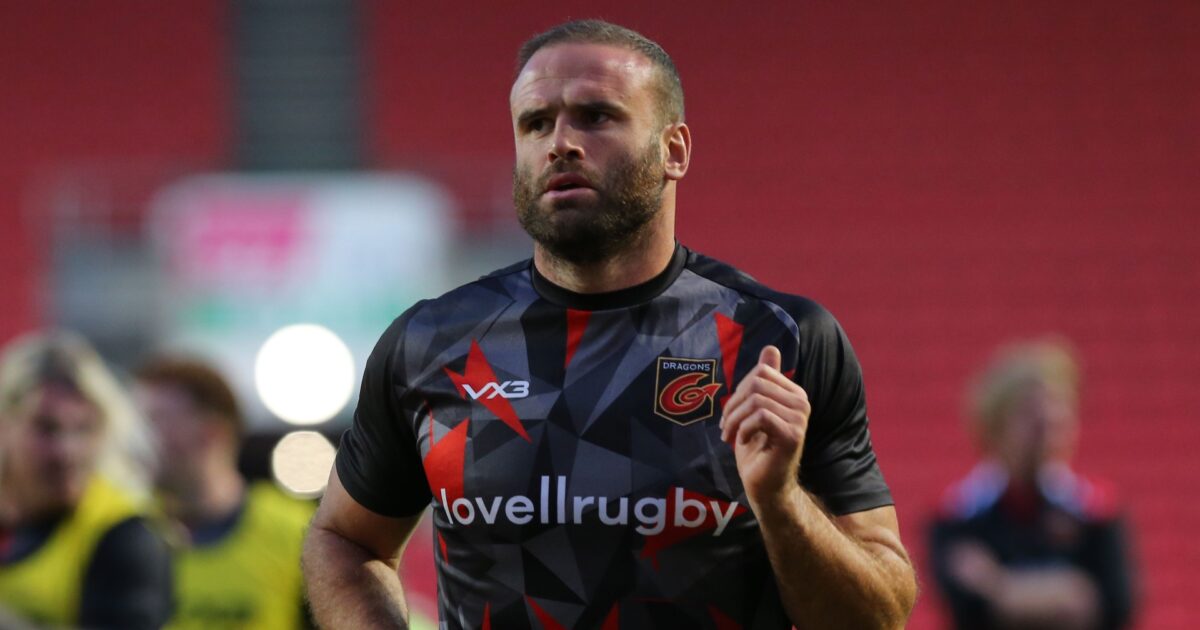He's 33 and a qualified doctor but Jamie Roberts fears retiring from rugby

Former Wales midfielder Jamie Roberts has revealed that although he is a qualified doctor, the prospect of retiring as a rugby player in the next year or two is filling him with dread.
Out of the Welsh reckoning since the last of his 94 caps was earned in November 2017, the 33-year-old midfielder has appeared for three clubs this year, moving from Bath in England to the South African Stormers last January and then linking with the Dragons in August after returning to Wales for the lockdown.
The 2009 and 2013 Lions Test centre isn’t exactly sure how long he will continue to play and neither is he certain what career he will take up when he finally hangs up his boots, a situation that he is uncomfortable with.
Making his debut appearance on the new RugbyPass Offload show, ex-Wales talisman Roberts candidly discussed his fears of life without rugby with Dylan Hartley, the now-retired England captain who is trying to find his own way after a career in the front row.
“It’s going to happen to me,” said Roberts, taking up the topic of when he might call it quits as a player following a stellar career with a myriad of clubs and with Wales. “I don’t know if it is at this end of this year or maybe another year, we’ll see. I have spoken to past players about lads struggling, it’s probably the most daunting time. I’m scared s***less to be quite frank with you.
“It’s very odd for me personally because I don’t ever feel like I was a rugby player"
– It's just 15 months since James Haskell retired from playing but he has been so busy outside the game his old identity doesn't define him 👨💻https://t.co/YVVKw2fAxu
— liam heagney (@heagneyl) August 17, 2020
“Look, I have been lucky that I have worked hard and have got stuff in the bank, my degree and what I can go on and do. But I am worried, desperately worried. The biggest challenge comes with not knowing what I want to do.
“Even still, the first step towards being sane in the afterlife of finishing rugby is taking real personal responsibility while you’re playing. We have a massive responsibility towards players in the game that they are doing something outside the game.
“It makes better people, it makes better players, we are a business of producing good people as well as good rugby players. And how many players have you played with Dylan who are brilliant, brilliant rugby players but couldn’t hold a conversation in a room of sponsors and corporates for example?
“We have a huge responsibility to do that to make sure people are rounded and they have things outside the game. I don’t think it’s quite there yet and for me, that’s the biggest driver to help people after playing is doing it while they are still playing.”
Hartley recently detailed the punishing after-effects of his career in rugby in his newly published autobiography and he was in awe that Roberts had found the time while playing to secure his medical qualification.
“Physically from a welfare point of view, I feel like the game has got a responsibility to look after its players better post rugby,” said Hartley. “I’m one of those guys now and it’s pretty quiet, it’s tumbleweed out there when you finish… it’s really inspirational that you became a doctor because when you leave rugby there is absolutely nothing.”
Roberts responded by explaining how he managed the onerous task of balancing education with his rugby as an emerging player in Wales. “I became pro in my third year in uni. I was in the academy so I hadn’t broken into professional rugby scene when I was 18, 19 so it was a case I’m going to go uni, I’m still in the academy playing semi-professional rugby. I’ll see how it goes because I didn’t have a professional contract.
“It was only after I was halfway through my second year, start of my third year I got my first professional contract with Cardiff Blues and I battled many times with the idea of quitting university. Lots of times thinking this is too much, but I kind of loved the challenge of trying to do both and not failing at both because the biggest fear is you become average at both and don’t achieve anything.
“I loved that kind of fear, the challenge to perform on a Saturday and nail some exams towards Christmas time. Six Nations would come around and it would be like right I’ve got to deliver. Then some exams in the summer and what have you. I was stupidly busy and when I reflect on it now I couldn’t do it again.”
As a medic, Roberts added that long-term injury issues go with the territory of being a rugby player. “When you accept the career you go into as a professional rugby player, you accept that it is going to do harm to your body. There are no two ways with that.
“When you’re a young guy and you sign up to this life in professional rugby you have got to understand that come 50, 60, maybe even earlier for some people, late 30s, 40s, you are going to be at risk of knee replacement, shoulder replacement, ankle surgery, what have you. That’s a given. It’s an obvious thing to state.”
– To listen on iTunes, click here
'There are over 2,000 people around the world that are registered to play with these goggles'
At the start of the 19/20 season, @ianmck7 was taken aside & told Treviso no longer needed him. But his remarkable rugby story isn't over, writes @heagneyl 👨💻https://t.co/buSG3f6JkU
— RugbyPass (@RugbyPass) September 27, 2020










































































